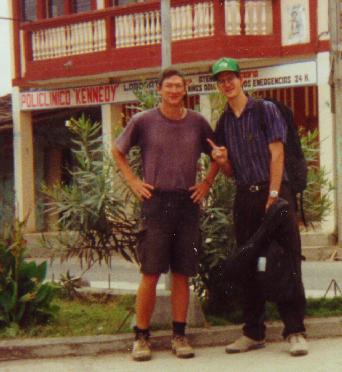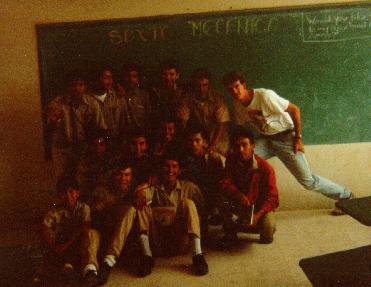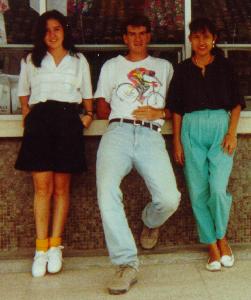
"L.A.? Really? Which part, San Francisco?"
Yes, as much as things change, they stay pretty much the same. If there's anything that sticks out in my mind about Mexicans, it's their belief that Los Angeles covers most of the United States. And D.C. is in there somewhere as well. And so it is for Ecuador. However, as cities go, I'd rather be known as a product of Los Angeles than New York.
It's hard to explain, but Los Angeles seems like the Latin Americans' city, which is why I tell people that's where I'm from, even though it's a lie. It just seems that Los Angeles, of all American Cities, is most palatable to the Latin American mind. It's name is Spanish, they've heard of it, it's known to have a large Latino population, but most of all, it's the answer they expect. For whatever reason, (perhaps because a lot of Gringos like me keep on telling them) most seem to think that ALL Northamericans live in Los Angeles. People like answers they expect; it makes them feel educated and important as if they are already familiar with the subject about which you're answering questions. Like if a visitor from Sinaloa were to tell me he was from Escuinapa, I'd nod and act polite. But if he were to say that he were from Mazatlan, I'd be delighted. Well, Maztlan! Of course I know my Mexican cities!
I poked at it and asked the waitress, "Is this meat?" "It's what you ordered," she replied, somewhat confused. "Is this meat?" I tried again. "It's what you ordered." She was good. I changed my technique. "Is this chicken?" I asked, eyeing it suspiciously. With an affirmative response, she scurried away, tucking yet another "slow gringo" story under her belt. It was the first of many gastronomic delights that I was to enjoy during my stay. Oh, and a note to any of my readers who may be budding chefs: If the idea "Chicken Loaf" ever pops into your mind, forget it. Forget it fast.
Confusion? No, Never! Well, it seems that any initial fears I had of not being able to find people with whom to communicate with and on only my third day in Quito. It all started on my second trip to the Mitad del Mundo. I went the day before Monday, but it was closed. Yes, they closed the Equator. All was not lost, though. I did meet this nice woman named Zandra, and she wants to be pen pals, so nos vemos, verdad? Anyway, on the trip up there by bus (it takes an hour and it's a blast. The ceiling is only five and a half feet high and the buses are always jam-packed) I sparked a conversations with an interesting man from Peru.
Anyway, we talked for about 40 minutes, discussing, in no particular order, Utah, Mormons (of which he counted himself one), reasons for the economic privatization of Peru, racism in the United States, Peruvian/Ecuadorian border disputes, indeginous peoples, the American political process, and of course, differences between Latin American women and Gringas. (On this last note, I wasn't able to add much, which should make my parents happy. But hey, I've only been here three days!). Our discourse was cut short by my next endeavor which was bien turistica, por lo menos.
I decided to take a van tour of the nearby (from the Mitad del Mundo) Inca Ruins and volcano crater. Unfortunately, I was joined by two people from the states who spoke no Spanish so the tour (2 hours) had to be conducted in English (Our tourguide's English by the way, wasn't very good). Anyway, we dropped those two off at the crater and the two of us started speaking in Spanish immediately. I guess you have to put aside embarrassment if you want to learn the language. He told me of his young tour business and how he hoped to expand its appeal to more gringos in Quito. Taking a page out of my mom's notebook, I went to great lengths to explain how Gringos were willing to pay for convenience and how he should offer a package deal with advertisements in English with a pick-up and drop-off in Quito. And drawing on my own experience in the radio, I explained to him how he might be able to promote his tours for free in the ritzier hotels. All told, we parted on good terms and the woman I'll be corresponding with is his co-worker, so perhaps we'll meet again. Oh, and I had to sign out in his register. It says, "Jose Claerbout. A man who will one day be well-known all over Latin America." Time to lay off the ego pills, I guess.
So off to lunch. After a little bit of initial confusion, I was seated in a restaurant in surrounding the tourist sprawl of the Mitad. After discerning my American-ness my eager waiter put me to the task of translating his favorite New Kids on the block song, a task that apparently some Canadians several months ago were not up to. However, after realizing the poor sound quality of the tape and the sheer inanity of the lyrics, I gave up and apologized to my waiter, who then brought my meal. Fried cheese- filled potatoes, I think. After I had finished, he politely asked me of one last question. Hoping against hope against any hidden Bon Jovi CDs, I opened myself to the question, a question that I've heard more than once in Spanish. "Is there work in America?"
So it was time for my speech; I had given it before. I did my best to explain to him that American Employers have a nearly infinite pool on non-English speaking Latinos. Without English, he'd be lucky to get a job scraping gum off toilet seats. Or I said something to that effect. The thing is, that I didn't want to be party to either the inflation of this man's misguided expectations, or the destruction of his life. What I learned throughout our conversations was that, at 22, he was the owner of the restaurant, did a lot of the cooking and had done all of the designing for the additions to the dining room. This led us to a discussion of architecture and his desire to study it in an American University. He had recently graduated from an Ecuadorean Technical school. I'm not conveying this well, but the man I was talking to, Sandro, was very likable. Young, good looking, intelligent, articulate, eager, someone I wanted to help if I could. So, here's where I probably went wrong, but I hope not. I thought of the International Students at Pomona and of the financial aid they receive. And then I thought of the goal of "diversity" so strived for on all American campuses today.
And so I recommended applying to an American university. Then came visa questions and he told me of his friend who had obtained a tourist visa an then just stayed in New York and how his plan was to do the same. My response? Well, the US government can pay me later, but I just told him to cool his jets and drop me a line when I got to the states. I really liked Sandro, and wanted to help him. My hope is that my sometimes unguarded optimism and occasional laziness regarding personal contact don't lead to yet another deflation of this young man's dreams.
Lyric I just heard on the radio "I am not the rock that stops the wave; I am made of flesh and bone." I just thought it was funny, that's all.
Book idea! A gringo goes to Mexico to learn how to drive a bus, does it for one year, then writes his memoirs! We'll just chalk that up as another thing you can do with a Latin American studies major after graduation.
On the way back from the Mitad, I met two nice young ladies going back to Quito who were of course more than happy to be my conversational partners for the trip home. At one point, one of them asked me, "Do you like babies?" I think my response, something like, "Yeah, they're sort of like puppies" would explain their silence for the rest of the trip back to Quito.
Rules of Honking Etiquette in Quito
On my last day in Quito I decided to do as my father had wished and hand deliver SEP-CD4 to the engineer Francisco Hallo. Easier said than done. I found the Polytechnic University very easily. After a few minutes of questioning I got myself to the Facultad Ingenieria (By the way, that's almost impossible to say in Spanish). Needless to say, the Facultad Ingenieria I was at was of the Catholic University, whose women were under the constant protection of a continuious wall that separated them from the Polytechnic.
Being the heathen male that I am, it took me some time to negotiate my way around this obstacle and start my search afresh. To make a long story short, I finally found the Geophysics department on the eighth floor of the civil engineering building. (A side note for any aspiring Ecaudorian Geophysicists: This 10 story building had neither an elevator nor hallway lights. And it smelled funny.) Mr Hallo, of course, was not in, but the secretary luckily had the goodness to demand that his assistant meet me where I was so that I could cease my travels. And for that I was endlessly grateful. Hallo's assistant, Byron Taufur (28, looks 18, guessed 22) was amazingly kind and generous. He promptly insisted on taking me out to lunch where we discussed an array of things.
Like all Ecuadoreans, he had taken English but couldn't say a word to save his life. This makes me appreciate more the Spanish classes I'd taken, but reinforced the belief that said classes should take a 180 degree turn away from the teaching of writing and literature. Byron and I spent the whole day together, and when I went to meet him later on, his boss insisted on taking me wherever I needed to go. After buying a few economics books (by Hallo's favorite Ecuadorean economist), Hallo's offer meant a trip to the bus station to buy my ticket for Macara. The bus ride was cheap (seven dollars), but interminable (twenty hours on the dot). The quality of the buses mirrored that of the better touring buses I had ridden in Mexico. Sort of a shame; at this stage in my life I'm more looking for "experiences" than boredom. I managed to sleep for two hours and had the luck that Andrew and Amy were waiting for me upon my arrival.

My next two meals? Cow liver (not very good) and cow stomach (really quite disgusting, actually.) I saw that a little bit of knowledge can be a terrible thing, as my appreciation of the stomach was severely marred by the voices of biology teachers past commenting, "You see those small, fingerlike projections on the surface of the stomach? They're called the villi. It's on and through them that digestive processes take place." I never thought I'd leave Ecuador seriously considering vegetarianism. Soy burgers don't have any villi.
A special note on this school - Unlike NorthAmerican high schools, the students were put into concentrations: Mechanics, agrinomics, computation, secretarial, and accounting. Due to enrollment, these classes are sexually segregated with women studying the latter choices, and men the former.
Brigham Young may have its "Mommy Track", but I was now on the "Bubba Track".
I had some ridiculous number of classes, eleven, I think, a rotating seven of which I attend every day.
My favorite teaching method thus far? My Geographic economics teacher who merely has the class write down verbatim what she dictates, very slowly, including words like "period", and "comma".
 [[Jos later did some
teaching of Mechanics.]]
[[Jos later did some
teaching of Mechanics.]]

Nevertheless, Sambo's father, Ing. Roman queried me on what I had done earlier in the day with his son. Not having either the cranial ability or inclination to lie, I told him the truth, that we had gone over to Peru to drink some beers.
To once again condense a conversation, he told me of his concerns regarding his son's drinking (all the while offering me not one, not two, but three tragos). This one put me in the sticky situation of empathizing with the father (Sambo does drink a lot) but not wanting to rat on a friend I had only known a few days. His father was extremely nice and invited me to lunch in the coming week. As I should have predicted, he forgot about it the next morning. I suppose that he was drunk when he extended the offer.
We travelled with another boy a year or two younger than me, Javier, (Both Sambo and Hernando are 16. What am I now, 19? Ugh, a dinosaur.) The border is essentially a 20 meter bridge that crosses the river that separates Peru and Ecuador. I had all of my papers and checked in on the Ecuadorian side with ease and they issued me my day pass. Neither Sambo nor Javier had brought passports, telling me that they weren't necessary.
As we entered Peru we were ushered into their proper border shack (quality enough to have faded beer ads in the windows) where we were all hassled almost immediately. I just left all the haggling to my companeros and handed over my passport when anyone pointed over to me. Sambo and Javier were sent back to Ecuador to receive proper papers; I think I was told I couldn't enter either. Regardless, after a brief discussion about American job opportunities with the guards, we entered anyway.
So there we were, drinking our Cristales when Sambo decided that he wanted to play the L7 tape that I had given him earlier. I still had very little tolerance for alcohol, so, being mildly buzzed, was not too concerned about the cultural impact of four punk chicks from LA. As the music started on the portable boombox, Javier explained to us that the guard was just looking for a bribe, which is why he hassled us so. Anyway, we were laughing over this (had I forgotten to mention that our outdoor restaurant was right next to the border check post?) the Peruvian passport-checker came up to us and solemnly asked me to follow him back to the shack. I was slightly lightheaded and not looking forward to the effect that this might have on my ability to talk myself out of trouble; my Spanish was unspectacular enough as it was. Actually, that may have been the point that saved me. As I sat in the dark office now observing the beer ads on the window in reverse, our conversation went thusly:
"I'll try sir. But my Spanish is very bad and often I don't understand what is said." (More or less the truth; but I understood what he said next)
"Well, you're in a country illegally drinking alcoholic beverages. This is very serious."
"I'm sorry, is there a fine that I'm supposed to pay?"When he answered in the negative, I tried again.
"Well, if there's any way I can assist you, tell me".He assured me that there was not and that he only wanted to see the the laws were followed to the letter. I had resigned myself to a bribe significantly higher than the 50 cents that I had expected when suddenly, Hernando walked in.
The border guard had a hard time believing that Hernan was really Macarenan (He's whiter than I am) but his fluid Spanish and apologetic tone convinced the man otherwise. But Hernan wasn't just there to watch, he was there to save me. Countering the fraudulency of the charges with some of his own, Hernan delved into a long story of how I was actually just an exchange student studying at the colegio and wouldn't it just be better if we could avoid any unpleasantries and so forth. I elaborated by explaining that an Ecuadorean student was currently living in my house and that my parents had gotten the idea for the exchange after hosting some Japanese students several years ago. (Just remember folks - bald-faced lies are always more believable when mixed in with the truth!)
While our Peruvian friend was pondering all of this, his captain entered the room and quickly gave us the impression that he had better things to do than hassle a confused gringo. To save face, a letter was dictated any typewritten detailing my situation to which both Hernan and I had to give out thumbprints and signatures. After all this "official and necessary" business was done with, I was free to go, and curse in English out the back up a pick-up truck as we headed back to Macara.
One last note - while looking through my passport, the captain came across my vaccination card, stamped with the US Health Department seal, in which an anchor figures prominently. After seeing this, I then had to convince him that no, I was not enlisted in the navy and had no military interests in Peru.